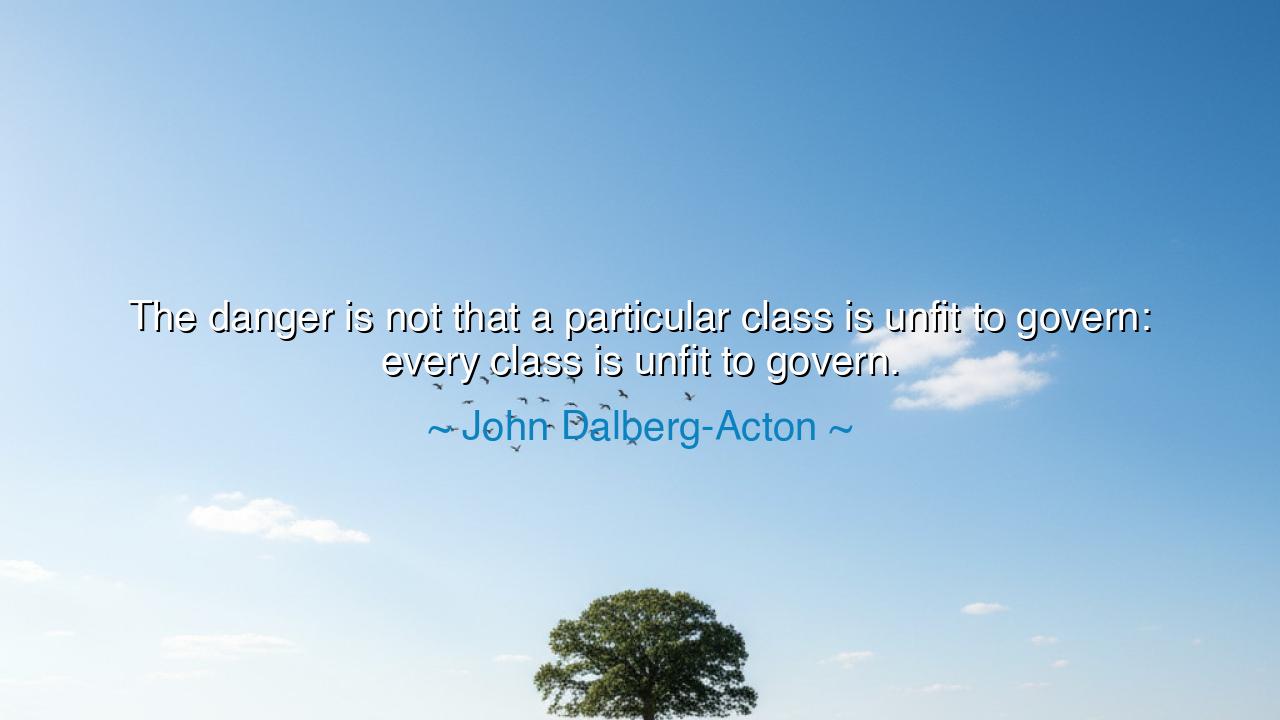
The danger is not that a particular class is unfit to govern:
The danger is not that a particular class is unfit to govern: every class is unfit to govern.






In the twilight of the nineteenth century, when the world stood poised between the ruins of monarchy and the rise of democracy, John Dalberg-Acton, that noble historian and guardian of liberty, uttered a truth carved from the granite of experience: “The danger is not that a particular class is unfit to govern: every class is unfit to govern.” These words, austere yet luminous, strike at the very heart of political wisdom. They reveal that corruption and tyranny are not born from one class or party, but from the frailty of the human soul itself. It was not kings alone who oppressed mankind, nor nobles alone who squandered power — it was humanity, whenever and wherever it forgot humility, restraint, and the sacred weight of justice.
The origin of this quote lies within Lord Acton’s broader reflections on power and morality, themes that shaped his most enduring thought. Known for his immortal warning — “Power tends to corrupt, and absolute power corrupts absolutely” — Acton saw government as a moral test, not a privilege. In this particular statement, he expanded that insight: it is not that kings, aristocrats, or commoners are uniquely unfit to rule, but that no class of men can be trusted with unchecked authority. Every group, once seated in power, begins to see its own interests as righteous, its own privileges as necessary, its own rule as destiny. Thus, the danger lies not in who governs, but in the belief that anyone can govern without limits or accountability.
Throughout history, this truth has been proven in blood and sorrow. Consider the fall of the French Revolution. It began as a cry for liberty, equality, and fraternity — a revolt against the aristocracy’s cruelty and the king’s indifference. The people rose in righteous anger, seeking to replace tyranny with justice. But once they seized power, the new rulers — the Jacobins, the Committee of Public Safety — became the very monsters they had overthrown. The guillotine, once a symbol of liberation, became an instrument of terror. The poor, who had risen against oppression, now suffered under the hands of their own kind. Acton’s truth was laid bare: no class is immune to the poison of power.
And so it has been in every age. The aristocracy, ruling by birthright, justified their dominance as divine order. The bourgeoisie, rising in industry and trade, cloaked their ambition in the language of merit. Even the working class, in some revolutions, has fallen prey to its own form of despotism, silencing dissent in the name of equality. Each class, believing itself virtuous, forgets that virtue withers when enforced by authority. Acton saw that the lust for control is not the property of any one group — it is the universal flaw of mankind. The hand that wields the scepter, whether gloved in silk or calloused by labor, trembles with the same temptation to rule rather than serve.
But do not mistake Acton’s words for cynicism. His was not the voice of despair, but of discipline — the wisdom that freedom demands eternal vigilance. If no class is fit to govern absolutely, then every system of government must be built upon restraint and balance. The ancients knew this truth well: the Greeks divided power among their citizens; the Romans built their republic upon checks and councils; and the framers of modern democracy wove the same principle into their constitutions. The structure of liberty, Acton teaches, is not founded on trust in any class, but on the limitation of all power, so that no man, no faction, and no majority may enslave the rest.
This truth is not merely political — it is moral. Every soul must learn to govern itself before it dares to govern others. Pride, when given authority, becomes tyranny; righteousness, when untempered by humility, becomes oppression. Acton’s warning, therefore, reaches beyond kings and parliaments into the heart of every human being. Each of us holds power — in our homes, in our work, in our words — and each of us must remember that to rule is to serve, and to serve is the highest form of rule.
Let this, then, be the lesson for all generations: never place blind faith in any ruler, party, or class. Do not imagine that virtue belongs by nature to the poor or the rich, the noble or the common. Guard your freedom through law, through conscience, and through vigilance. Build systems that bind even the powerful in chains of justice, and never cease to question those who claim to rule for your good. For liberty lives not in the trust of men, but in the discipline of institutions and the courage of citizens who refuse to surrender their reason.
So remember the words of Lord Acton, wise and unwavering: “The danger is not that a particular class is unfit to govern: every class is unfit to govern.” It is a truth that humbles kings and empowers nations. Let it remind us always that freedom dies not in the roar of tyranny, but in the silence of those who forget that all men, when left unguarded, are tempted to become tyrants. Therefore, let vigilance be your crown, and let humility be your scepter — for in the balance between them lies the salvation of every free people.






AAdministratorAdministrator
Welcome, honored guests. Please leave a comment, we will respond soon